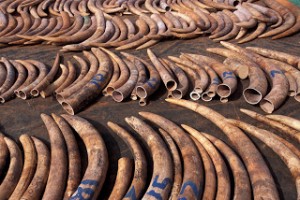 As reported by BBC earlier this month, a heavily armed gang has killed an unknown number of elephants at a world heritage site in the Central African Republic. According to World Wildlife Fund (WWF), the ivory poachers were seen using a scientist’s observation platform to shoot the animals, which gather there in large numbers. Up to 200 elephants are said to gather daily in one location to drink mineral salts present in the sands.
As reported by BBC earlier this month, a heavily armed gang has killed an unknown number of elephants at a world heritage site in the Central African Republic. According to World Wildlife Fund (WWF), the ivory poachers were seen using a scientist’s observation platform to shoot the animals, which gather there in large numbers. Up to 200 elephants are said to gather daily in one location to drink mineral salts present in the sands.
The site is in the Dzanga-Ndoki Park which is located in the south-western corner of the Central African Republic (CAR), where it borders Cameroon and the Republic of Congo. It is described as a unique habitat for forest elephants in particular.
WWF issued a warning that a group of 17 individuals, some armed with heavy-calibre rifles, had entered the park and was heading for the Dzanga-bai, an area known locally as the “village of elephants”. It is believed that the raiders were Sudanese ivory poachers who have been trying to operate in the area and are now taking advantage of the lawless state of the country.
The elephant raid has also alarmed international conservation authorities. African countries have seen a serious spike in the illegal killing of elephants because of the high demand for ivory especially from China which is now at the highest level in 16 years.
Earlier this year (March, 2013) the Thai prime minister promised to outlaw Thailand’s domestic ivory trade. Yingluck Shinawatra’s announcement at the opening of wildlife trade meeting, Cites in Bangkok, came as African elephants are once again in danger of extinction. During the Cites meeting, a video address from the Duke of Cambridge, Prince William, appealing to nearly 200 governments, to tackle the illegal wildlife trade was shown.
It has been reported that more than half of ivory on the streets of China is illegal, and that is in spite of reports that the government of China is trying to control the illegal trade. However, China is more and more under pressure and scrutiny. Guardian reported that in 2011 more than 150 Chinese citizens were arrested across Africa and according to the Kenya Wildlife Service, 90% of ivory seized at Kenya’s airports involves Chinese citizens.















